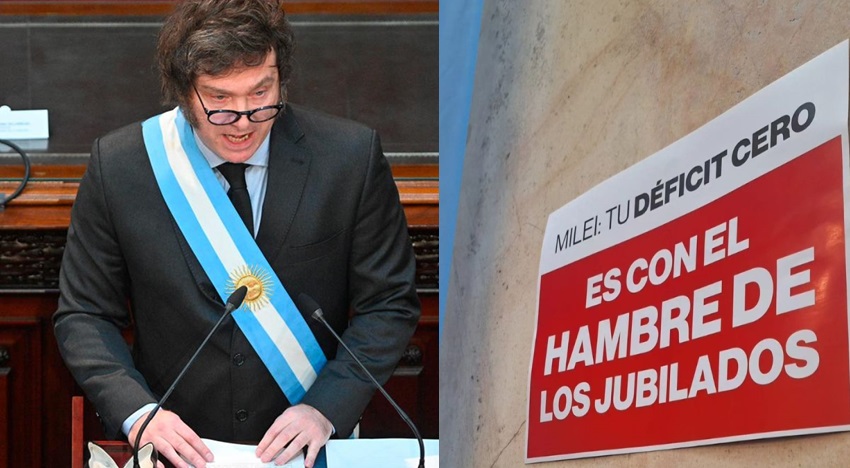
Julie Kozackspokesperson for International Monetary Fund (IMF)stated this Thursday in a conference from Washington that “given the very delicate social situation, together with the already very high poverty rates in Argentina, it will be important to ensure additional social assistance and preserve the real value of retirements.”
The organism praises the course of brutal adjustment that Javier Milei and Luis Caputo are carrying outbased on the liquefaction of salaries and pensions with inflation and budget cuts that jeopardize the continuity of the operation of hospitals, universities and other public services, along with layoffs of public employees and the brakes on public works.
In just 3 months the drop in retirements will amount to up to 30%, depending on the level of assets, since the Milei government kept the bonus of 55 thousand pesos frozen for the lowest assets in January and February, while inflation was above 20% in January and will be around 15% in the second month , and in March the mobility update will not compensate for inflation or the bonus that was barely increased to 70 thousand pesos. For its part, in just two months Registered salaries had a loss of 21%. At the same time, it is sinking economic activity and the door opens to thousands of layoffs in the private sector, along with layoffs in the public sector.
Aware of the jump in poverty for thousands of families, this does not prevent him from speaking cynically about the need to “support vulnerable segments of the population and, as I already said, it is very important for us that, according to the program, the burden of adjustment does not fall on working families and the most vulnerable segments of the population”, as Kozack stated.
More support for Milei’s adjustment
The spokesperson publicly reaffirmed the recent statements of the head of the IMF, Kristalina Georgieva and number two, Gita Gopinath, in favor of Milei’s program. “An ambitious stabilization plan is being implemented to correct serious policy slippages in the final quarters of 2023 and get the program back on track,” she said.
Likewise, he stressed that “the plan focuses on establishing a strong fiscal anchor along with policies to lastingly reduce inflation, rebuild reserves and address distortions, as well as long-standing impediments to growth.”
In this sense, he assured that “good progress is being madebut of course the path to stabilization will be challenging and that requires strong policy implementation and agile policymaking.”
And furthermore, the Fund seems confident that this plan will allow inflation to slow down since “reducing inflation is so important when it comes to protecting the most vulnerable because we all know that inflation is a tax on the poor.” The words of each official of the organization concerned about “the poor” hide their intentions to get Argentina to implement structural reforms in labor, pensions and taxes in favor of big capital, open the doors even further to the extractivism of large multinationals and continue looting resources with the payment of the debt. Nothing could be further removed than a program in favor of “vulnerable sectors.”
“The strong fiscal consolidation, the elimination of monetary financing together with the improvements in the monetary and exchange policy frameworks are expected to generate a process of gradual disinflation and We are already seeing that this works. “We are seeing some results in this area with inflation starting to decline,” Kozack said.
An audit of the credit taken by Macri and the same officials that they now praise?
Three officials from Independent Evaluation Office (OEI) from the IMF silently came to the country to hold meetings with former officials of the Macrista administration who negotiated the agreement stand by with the IMF. They would seek to determine whether the board acted in accordance with the statute for the loan of US$ 45,000 million to the government of Mauricio Macri.
Although there was no official confirmation about the holding of these meetings, the OEI delegation will try to meet with the Minister of Economy, Luis Caputoformer Secretary of Finance and president of the Central Bank during the Macri government and with the former president of the Central Bank at that time who is today a presidential advisor, Federico sturzenegger.
Because of this, at this Thursday’s conference Kozack was also consulted on the matter and noted that the IEO’s current work program includes the evaluation of past exceptional access programs and said that the 2018 Argentine program “is one of those programs, but it is not the only one that will be examined as part of this review.”
But the so-called “audit” would be just a “consultation.” Precisely, the IEO will ask those mainly responsible for the mega debt, fraudulent, illegal and illegitimate, “whether they believe that the country met the four requirements” for the Fund’s board of directors to grant the credit. In the Argentine case, with the US$ 45,000 million agreed upon, that quota was exceeded by more than 1,200%.
Those four criteria are: that the requesting country experiences or may experience a balance of payments crisis; that the country’s public debt be considered “sustainable” in the medium term; that the economy in question has prospects of returning to the capital markets to face the repayment of the loan and, fourthly, that the program has certain chances of successby executive implementation but also by the existence of a political context that supports it.
It is known for certain and proven ad nauseam that the 2018 loan (money that Argentina continues to owe today because in the Frente de Todos government it was restructured with another condition of “Extended Facilities”) did not comply with the statutes of the Frente de Todos. Monetary Fund because it was used for capital flight, as a Central Bank report showed, and for the rescue of private creditors.
It is also proven that the loan did not comply with the minimum administrative procedures of the State, it did not go through Congress as required by law, but above all, that it is a “hateful debt” because it was taken behind the backs of the working people and against the interests of society. A mortgage that today wants to be burdened on the backs of the working majorities, retirees and poor people, for the benefit of a handful of financial speculators and economic power.
To end the adjustment of the Milei Government and the IMF, a break with the Monetary Fund and the sovereign ignorance of the debt is necessary, on the basis of popular mobilization. The union centers must call for a national strike and a plan of struggle to defeat the adjustment plan, the DNU, the attempts to advance with structural reforms and begin to propose a solution in favor of the interests of the working majorities. You can’t wait for the adjustment to pass, the fight is now.
Source: www.laizquierdadiario.com

